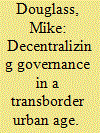| Srl | Item |
| 1 |
ID:
128523


|
|
|
|
|
| Publication |
2013.
|
| Summary/Abstract |
The devolution of political power to local governments is taking new directions as cities begin to look beyond national borders to create economic synergies with city regions in other countries rather than continuing to look to linkages with their capital cities for economic benefits. In East Asia the search for transborder urban linkages comes at a time when secondary cities in higher income countries are confronting major social and economic transformations. These new trends include: the rise of China in the global economy, the turn toward neoliberal downsizing of government, demographic transitions toward declining, rapidly aging populations with a diminishing labour force compensated partly by the large-scale recruitment of foreign workers and foreign spouses. The combined result of the new dynamics is that just when political power is being devolved to the urban scale, the global trend of "shrinking cities" has reached them. The discussion focuses on recent initiatives of the local governments of Busan,OLYMPUS DIGITAL CAMERA South Korea, and Fukuoka, Japan, to build a "common living sphere" through transborder linkages to provide a culturally rich, people-centered alternative that contrasts with the high-technology industrial clusters being planned for them from their corporatized capital cities. In addition to economic issues, cities engaged in such transborder initiatives challenge the meaning of national borders and citizenship while also confronting new issues in accommodating the appearance of multicultural societies, which have all remained outside of mainstream discussions on decentralization.
|
|
|
|
|
|
|
|
|
|
|
|
|
|
|
|
| 2 |
ID:
141333


|
|
|
|
|
| Summary/Abstract |
Like other global cities, over the last few decades, Hong Kong has experienced significant economic restructuring with emphasis being shifted to the service sector and the demise of the manufacturing sector. Such economic transformations have inevitably influenced job availability. Without sufficient jobs available for less educated and less skilled workers, a growing number of citizens have experienced a decline in living standards and have even suffered poverty. This article sets out, against the policy context outlined above, to critically examine major policies for helping poor children in Hong Kong, especially when they are confronted with intensified education inequality against the growing trend of privatization and marketization of education. More specifically, the major objective of this article is to examine critically how and whether or not education performs the function of enhancing people’s chances of upward social mobility and reducing inequality between the rich and the poor.
|
|
|
|
|
|
|
|
|
|
|
|
|
|
|
|